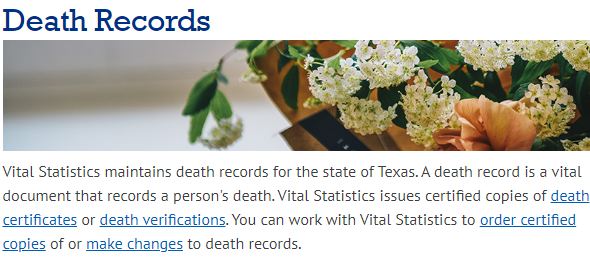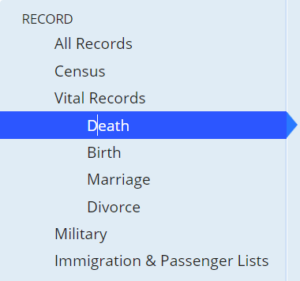
Search for Death Records in Texas
Free Texas Death Records Lookup

We receive referral fees from partners (advertising disclosure)
The information we provide you is free of charge and a result of extensive research by our product experts. We use affiliate links in our site that provide us with referral commissions. While this fact may not influence the information we provide, it may affect the positioning of this information.


In addition to assisting you in locating death records in the state of Texas, our complete reference to death records in the state of Texas will offer you with vital information about the deceased and the life that they lived.

Death Records in Texas -
The Ultimate Guide 2024
- UPDATED October 2024
Texas Death Records
The Texas Department of Vital Statistics is responsible for maintaining death data for the state of Texas. A death record is a legally binding document that documents a person’s passing. Certification of death certificates or death verifications is provided by the Department of Vital Statistics.
You can work with the Department of Vital Statistics to order certified copies of death records or to make modifications to existing death records. Texas was established as the 28th state of the United States of America in 1845. Death registration began in some counties as early as 1903, but statewide registration did not begin until 1908. Death data can be obtained through county clerks or the state Bureau of Vital Statistics, depending on where you live.

Texas Death Databases
Before 1890
Beginning in 1903, both at the county and state level, official death registration became a reality. From obituaries and probate records, however, there are a few deaths that occurred between the 1890s and the 1990s. Delayed registrations are handled under the same guidelines as ordinary death certificates. Church records, cemetery records, bible records, probates, census data, and newspapers are examples of other sources of information.
1890 to 1986
For deaths in this time period, there are a couple of databases you can try. The Texas database has both digital images and name indexes. At familysearch.org you can get a hold of images and names, although the dates vary from county to county. Ancestry.com is available at family history centers and it gives indexed names as well as some related files to the death certificates.
After 1986
If the date of death (exact) is known, you can order for the death records from the country of death or from the Texas Department of State Health Services

Death Certificates in Texas
Death records in the state of Texas are initially only available to the public 75 years after the date on which the record was filed, after which they become publicly available. Individuals who have passed away within the last 75 years are subject to certain restrictions when acquiring death certificates. There are several categories of people who are qualified to request a death certificate, as listed below:
- A registrant with whom the record is associated with
- Spouse
- Parents
- A descendant such as child / grandchild
- An individual with common ancestry (relative such as cousin, aunt, uncle, sibling or grandparent)
- Registrant’s legal guardian
- Agency / individual acting on the registrant’s behalf
- Legal representative to registrant’s estate

How to Find Texas Death Records
Obtaining Texas death records from Archives.com is the most dependable method of doing so. Following your registration for an account, you will have complete access to the death records for the state of Texas as soon as you log in to the platform. The following are a few simple steps to get you started:
Step 1: Go to Archives.com and log in using your email address and password.

Step 2: Use the buttons at the very top of the user page to navigate through the options. When you click on the “Search” button, the Texas state death records page is loaded.

Step 3: Check the box next to “Vital Records,” then click on the “Death” button just below it. Thus, the site eliminates all other records and only displays death records, which you can then download.

Step 4: Key in as much information about the deceased as you can remember about them.

Step 5: The state of Texas should be entered in the ‘Location’ box. As soon as you begin typing, you will notice that the website will provide a match for you.
Step 6: You will be presented with a list of records; you will need to scroll through the list until you find the person whose records you are interested in viewing.
Step 7: Click on the name of the deceased to view the death record that is currently available online. In most cases, you will be able to obtain their full name as well as their maiden name if they were previously married. You can also find out about their burial arrangements, such as whether they were cremated or buried, and whether a biographical sketch is available.
Alternative Sources for Texas Death Information
- Resourceful websites
- Obituaries
- Courthouses
- City Directories
- Tax Records
Texas Death Records FAQs
What is an Official Death Certificate?
An official death certificate refers to a death certificate that is issued directly by the Texas state government or any similar organization. This document contains information such as the individual’s name, physical address, date of birth, and date of death.
What are death records?
Death records are official files that give any useful information about a deceased individual. If you’re doing genealogical research, these records come in handy as they contain most of the information you’d need to learn more about your ancestry. Most death records are held by the state the deceased lived or died in, but they lack the burial state of the deceased. Both cemeteries and churches hold death records, as with state governments. Information you can obtain from death records includes the full name, date of birth, date of death, and place of death.
Are Texas Death Records Open to the Public?
Those who have a direct relationship to the person whose name appears on the record, including third parties, are entitled to view vital records such as birth certificates, divorce decrees, marriage certificates, adoption certificates, death certificates, and other life records, according to the Utah Revised Statutes.
What Information Do I Need to Search for Texas Death Records Online?
Requesters who wish to get a hold of a death record must be well acquainted with basic facts associated with it including:
- Deceased’s name
- Valid reason for death record request
- Death date
- County or city of death
- Valid proof of identification
Conclusion
The state of Texas is extremely particular about the accuracy of its tax and voting records, and this is reflected in its state records. As a result, they strive to keep a comprehensive death record up to date. Following the death of a person, tax collectors contact family members or next of kin to collect any unpaid state taxes that may be owed to the state. In the event of a probate proceeding, these death records will be extremely useful because your family members or next of kin will not have any difficulties in obtaining any legal information. With our comprehensive guide to Texas death record searches, you’ll be able to locate any type of record that you might require in a matter of minutes.
Disclaimer: OurPublicRecords mission is to give people easy and affordable access to public record information, but OurPublicRecords does not provide private investigator services or consumer reports, and is not a consumer reporting agency per the Fair Credit Reporting Act. You may not use our site or service or the information provided to make decisions about employment, admission, consumer credit, insurance, tenant screening, or any other purpose that would require FCRA compliance.

Copyright © 2024 · OurPublicRecords.org · All Rights Reserved